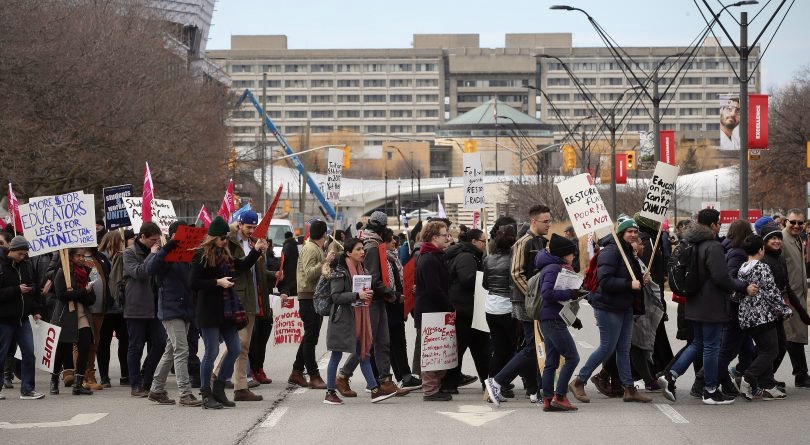It’s been three years since the longest strike in Canadian post-secondary history.
Recently, on August 31, the collective agreement which ended the strike expired, bringing CUPE 3903 and York back to the bargaining table. CUPE 3903 represents contract faculty, teaching assistants, graduate assistants, and research assistants.
According to a labour negotiations update released by the university on September 18, York sent CUPE 3903 a notice to bargain on August 26. The two parties have now commenced bargaining for the renewal of the collective agreements for Units 1, 2, and 3.
York University and CUPE 3903 have now commenced bargaining for the renewal of the collective agreements for Units 1, 2, and 3.
According to CUPE 3903 Chairperson Maija Duncan, bargaining is a standard process.
“It’s how we renew our collective agreements when they expire, which happens every three years. Those agreements set the terms of our work, including aspects that are good for students, like class sizes, training, or equitable hiring to ensure representation within teaching staff,” Duncan says. “It’s important to revisit these regularly to address issues as they arise.”
According to Advisor and Deputy Spokesperson Yanni Dagonas, bargaining will take place over Zoom “in light of the particular challenges of COVID-19.”
Regarding meeting virtually, Duncan says bargaining remotely has been an adjustment that is still currently in the works.
“We are currently in discussion with the employer regarding what that will look like,” Duncan says. “We are holding all membership meetings remotely over Zoom. It’s been a bit of an adjustment, but we’re quite good at it now! Likewise, bargaining will take place remotely.”
When asked about what is on the agenda, Duncan says the parties are still in the process of working out how to bargain effectively. “Between bargaining surveys and membership meetings, the membership will decide what our priorities are for the bargaining round, but we’re not there yet,” Duncan says.
However, with COVID-19 affecting teaching methods, Duncan says bargaining could possibly include matters that aren’t usually part of the collective agreement.
“The pandemic has also raised a number of issues relating to online teaching that aren’t covered by our collective agreements. I expect we will be discussing some of these at the bargaining table,” Duncan adds.
Online courses during a pandemic are already very difficult and having a strike during this time would complicate things much more.
When asked about how a strike would be conducted during the pandemic while students are not on campus, Duncan says the union has yet to discuss this.
With the 2017 strike fresh in their minds, students have expressed concerns regarding bargaining.
Aneesa Bacchus, a fourth-year human resources management student, says she would be distraught if another strike were to occur during her undergraduate degree, especially because she plans on graduating in June. “Online courses during a pandemic are already very difficult and having a strike during this time would complicate things much more,” Bacchus says.
Echoing her sentiments is Noah Aldoreh, a fourth-year human resources management student. “Any student that cares about graduating or finishing their courses doesn’t want a strike to happen,” Aldoreh says.
Regarding concerns, Duncan says bargaining is a normal process for unions and their employers. “While there’s no denying that the last two rounds of bargaining have been contentious, the vast majority of them conclude with a mutual agreement,” Duncan says.
On behalf of the university, Dagonas adds: “We respect the contribution of all employee groups to ensure we provide a highly valued educational experience in a supportive, inclusive, and caring environment to help prepare students for meaningful careers and long-term success. We are optimistic that we can reach a negotiated collective agreement with all our bargaining units.”


